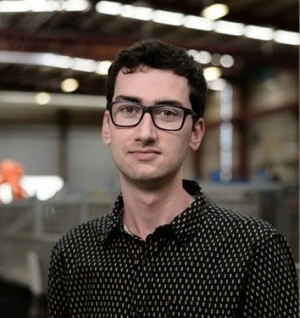Uni Grad to Intern to Junior Industrial IoT Engineer
What motivated you to join Facteon?
With graduation in sight, I presented my final university project at the AUT Engineering Student Showcase. My project involved working with a local robotics company to securely connect drones to the cloud. While manning my stall and discussing my project, I was approached by Facteon’s HR Advisor and Industrial IoT Manager. I was encouraged to apply for Facteon’s Internship Programme.
I knew I wanted to work in the area of Internet of Things. But Industrial IoT was foreign territory. It quickly became a topic of interest as I prepared for my first interview at Facteon. What appealed to me about this internship was the opportunity to work on a real-world project. I wasn’t restricted to a test site or a demo environment. I worked closely with experienced software developers, solutions architects and implementation engineers to build the software side of COSMOedge. It’s Facteon’s Industrial IoT edge computing device that connects machines and production lines with software solutions, such as COSMOline.
Describe your experience of being a Facteon Intern
Before I began my career as an Intern, I had limited knowledge of Industrial IoT. During my internship, I was given the opportunity to work on real-world projects. I think that has provided me with a very strong foundation. There’s no substitute for work experience. Of course, the support provided by the wider team was essential. As a junior, it can be very intimidating entering any work environment. Having a supportive team that’s willing to collaborate and answer questions is essential. It’s been a busy few months of soaking everything in and learning as much as possible.
The main challenge of my internship was that there isn’t a formula. I couldn't directly apply my university knowledge. There are multiple ways to solve each of the challenges we face but there is a ‘best’ solution. It’s been great to learn the skills to decipher what the best solution is, rather than just being instructed to implement a decision made by a more senior developer or solutions architect. I can say that I understand the ‘why’ behind the work I’m doing. That’ll allow me to continue to develop my skill set with the support of the wider team.
In moving from university to an internship, what was the biggest challenge?
It was great to be able to shadow 2018’s Facteon Industrial IoT Intern. It got some internship survival tips from someone who had been there. I think the biggest challenge was going from a grade-based and structured environment in which you’re regularly given feedback to the workplace in which you manage your own workload and there are multiple projects to juggle. Work is definitely keeping me busy.
How have you navigated the transition from Intern to Junior Industrial IoT Engineer?
The transition wasn’t overly challenging as when I was employed as an Intern, I was given a variety of opportunities to work on projects that were quite challenging. I think through being challenged, I was able to rise to the occasion. Even when I engaged in a shadowing capacity, I gained exposure to many areas of Industrial IoT as well as software and hardware development.
As the Junior Industrial IoT Engineer role has been newly created, it’s been great to be able to grow into the role and really define it myself. There weren’t preconceived ideas regarding the amount of experience or skills that someone in this role should have. Settling into the role has been an interesting process as I’ve been able to shape it to suit what interests me.
Where do you see yourself in five years?
My focus over the next five years is to enhance my ability to design solutions as opposed to just implementing them. I’d also like to work in a Full Stack Developer capacity as well as in DevOps. A couple of the senior developers here have taken on an unofficial mentor role. It’s been great to be able to talk to them about how I can keep honing my Industrial IoT knowledge and developing my practical skills as it allows me to map out a clear career plan.
What advice would you give to the next Facteon Intern?
To the next Facteon Intern, I’d say: “Take on the challenge and be prepared to work really hard. Don’t be put off if you have limited knowledge of Industrial IoT principles. It’s an area that’s developing rapidly with strong ties to Industry 4.0. Don’t pass up the opportunity to get involved in this evolving area now. Above all, have trust in yourself and your abilities. You might just surprise yourself with what you’re able to achieve”.

Connor Hewett
Connor is a recent university graduate who started his career with Facteon in late 2018 as an Industrial IoT Intern. He’s passionate about Industrial IoT and enjoys working closely with Facteon’s senior developers, solution architects and implementation engineers to create cloud-based software and reliable hardware to enable manufacturers to optimise their operations.
